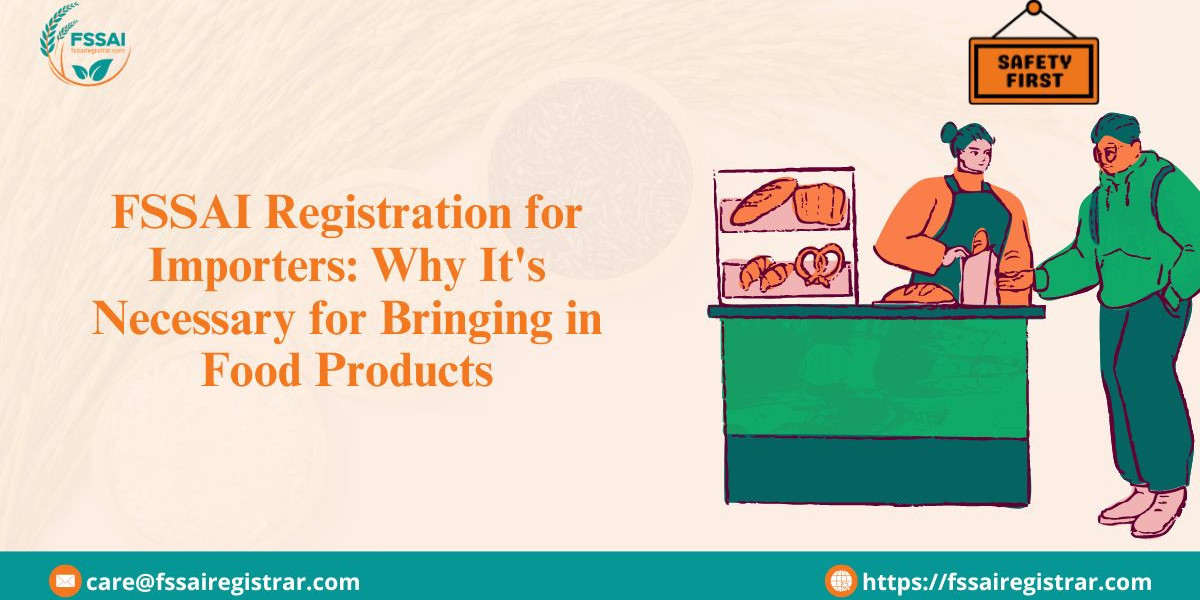In today’s globalized world, the exchange of goods and services across borders is an essential part of business operations. Food products, in particular, are among the most traded commodities worldwide, and many countries, including India, rely on imports to meet domestic demand for various types of food. However, when it comes to importing food, ensuring that the products are safe, hygienic, and meet quality standards is of paramount importance. In India, this responsibility lies with the Food Safety and Standards Authority of India (FSSAI). Any business or individual importing food products into the country is required to obtain FSSAI registration or a license. This process is crucial for several reasons, ranging from ensuring food safety to compliance with Indian laws.
Legal Requirement for Food Importers
One of the primary reasons FSSAI registration is necessary for food importers is that it is a legal mandate under the Food Safety and Standards Act, of 2006. According to this law, no person or entity is allowed to manufacture, store, distribute, sell, or import food products without obtaining FSSAI registration or license. Importing food products without this certification is illegal and can lead to severe penalties, including hefty fines and confiscation of goods.
FSSAI registration for importers serves as a regulatory framework that ensures that food items being brought into the country meet established safety and hygiene standards. This safeguard helps prevent the entry of adulterated, substandard, or unsafe food items into the Indian market, thus protecting consumer health.
Ensuring Food Safety and Quality
India is a country with diverse food habits and cultural practices, and ensuring that imported food products meet the safety and quality expectations of Indian consumers is critical. FSSAI’s role is to ensure that food products brought into India from foreign markets adhere to the stringent safety standards prescribed by the authority.
Through the FSSAI registration process, the food regulatory body assesses the quality of imported products. Importers are required to submit documentation related to the origin of the product, quality certificates, ingredient lists, and other relevant details. The FSSAI checks whether the imported food products meet its safety standards and are free from harmful contaminants, chemical residues, or adulterants. This quality control measure protects consumers from health hazards and ensures that imported products are safe for consumption.
Facilitating Smooth Customs Clearance
Another critical aspect of FSSAI registration for importers is its role in facilitating smooth customs clearance. When food products are brought into India, they must undergo a series of checks and inspections at the port of entry, and one of the key requirements for customs clearance is FSSAI registration. Without this registration, the imported goods may be held up by customs authorities, leading to delays, increased storage costs, and even the risk of perishable goods being damaged.
Having a valid FSSAI registration simplifies the customs clearance process and ensures that the goods are promptly inspected and cleared for entry into the country. It not only speeds up the import process but also helps importers avoid unnecessary delays and additional expenses.
Compliance with Indian Food Regulations
India has its own set of food regulations, many of which may differ from the standards and practices of other countries. The FSSAI is responsible for formulating and enforcing these regulations to protect consumer health and safety. Food importers must ensure that the products they bring into India comply with these regulations, which cover various aspects such as food labeling, ingredient lists, nutritional information, and permissible additives.
FSSAI registration helps ensure that imported food products comply with the food standards set by the regulatory authority. Importers are required to submit all relevant product details, including packaging and labeling information, to ensure that the products meet the labeling norms prescribed by the FSSAI. Non-compliance with these regulations can result in the rejection of goods at the border, leading to financial losses and reputational damage.
Eligibility for Importing Food Products
Not every business can simply start importing food products into India. To be eligible, importers must first obtain FSSAI registration or a license. This applies to businesses of all sizes, whether they are small-scale importers or large corporations. The FSSAI registration or license acts as a formal approval that the business meets the necessary criteria to import food items and is capable of adhering to India’s food safety standards.
There are different categories of FSSAI licenses based on the scale and nature of the business. For food importers, the FSSAI Central License is required, as it applies to businesses involved in importing food products into India. This license is mandatory for importers to legally bring food products into the country.
Access to a Wider Market
FSSAI registration also enables food importers to access a wider market in India. With the growing middle class and increasing consumer demand for foreign food products, India represents a lucrative market for imported goods. By obtaining FSSAI registration, importers can tap into this market and supply their products to a diverse range of customers, from retailers and wholesalers to restaurants and food service businesses.
Furthermore, FSSAI registration helps build trust with consumers and business partners. It signifies that the imported food products meet India’s safety standards, which can help boost the credibility of the importer in the eyes of customers and other stakeholders.
Building Consumer Trust
In a market where food safety is a top priority for consumers, having FSSAI registration gives importers a competitive edge. It indicates that the imported products are safe, hygienic, and compliant with national food safety standards. Consumers are more likely to trust products that are FSSAI-certified, as this certification ensures that the product has been thoroughly inspected and approved by a government authority.
For importers, this trust can translate into higher sales and stronger customer loyalty. Consumers are more willing to purchase foreign food products that are verified to meet Indian safety standards, knowing that the products are safe for consumption.
Avoiding Legal Issues and Penalties
Operating without FSSAI registration is not only illegal but can also lead to serious legal consequences for importers. The Food Safety and Standards Act prescribes severe penalties for non-compliance, including fines, imprisonment, and the confiscation or destruction of imported goods. By obtaining FSSAI registration, importers can avoid these legal issues and ensure that their operations remain compliant with Indian law.
Additionally, FSSAI registration ensures that the importer is prepared to handle any legal or regulatory challenges that may arise during the import process, such as food recalls or compliance inspections.
NOTE: APPLY FOR TATKAL FSSAI REGISTRATION
Conclusion
FSSAI registration is an indispensable requirement for food importers in India. It ensures that imported food products meet stringent safety and quality standards, facilitates smooth customs clearance, and helps importers access a vast and growing market. For importers, FSSAI registration not only ensures legal compliance but also builds consumer trust, boosts business credibility, and opens the door to a wide range of opportunities in the Indian food industry. Without FSSAI registration, importers risk legal penalties, delays at customs, and loss of market access, making it an essential step for any business involved in bringing food products into India.








